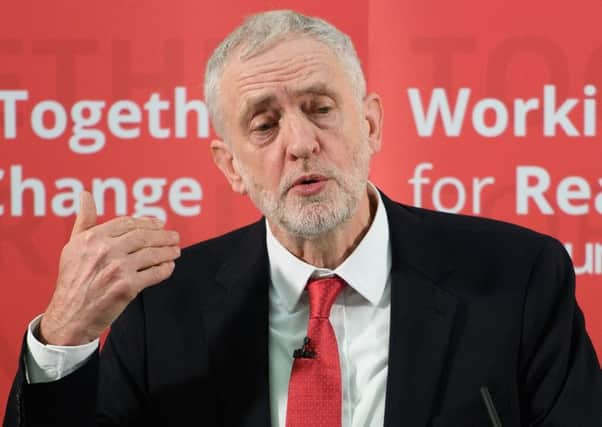Corbyn u-turns on free movement and wage cap in 'day of chaos'


In a speech that struggled to clarify his party’s position on immigration and Brexit, the Labour leader said he wanted the government to put “jobs and living standards first in the negotiations”.
Advisers had earlier briefed that Mr Corbyn would call for “fair rules and reasonably managed migration as part of the post-Brexit relationship” in a speech aimed at re-launching his leadership.
Advertisement
Hide AdAdvertisement
Hide AdThe Labour leader added a caveat to remarks suggesting he would accept an end to free movement, saying: “I don’t want that to be misinterpreted, nor do we rule it out.”
Mr Corbyn also clarified remarks made in interviews yesterday morning in which he appeared to call for a cap on earnings to clamp down on “utterly ridiculous” salaries for the highest paid bankers and footballers.
One of Mr Corbyn’s former economic advisers called his proposals for a wage cap “totally idiotic”, and several Labour frontbenchers struggled to give their full support to the proposals when quizzed by journalists.
The Conservatives said Mr Corbyn had suffered a “day of chaos”, while the Liberal Democrats claimed the Labour leader showed an “utter disregard for how things actually work”.
Before Mr Corbyn clarified his position, the speech appeared to have opened up a new rift between Labour north and south of the border over free movement.
Scottish Labour deputy leader Alex Rowley said: “Our position in Scotland is that we understand where people have concerns about a lack of housing, a lack of being able to get to an appointment to see your GP.
“But we say the answer to that is not to restrict freedom of movement. The answer to that is to invest in public services.”
Mr Rowley added that the suggestion of a wage cap was “an interesting discussion” but clarified that “those who earn more should pay more and that’s the policy of the Scottish Labour Party”.
Advertisement
Hide AdAdvertisement
Hide AdThe Labour leader initially raised the idea of a maximum pay cap during a series of broadcast interviews ahead of his first major speech of the year focusing on Britain’s future after Brexit.
“If we want to live in a more egalitarian society and fund our public services, we cannot go on creating worse levels of inequality,” he told BBC Radio 4’s Today programme.
“I would like to see a maximum earnings limit, quite honestly, because I think that would be a fairer thing to do. We cannot set ourselves up as being a sort of grossly unequal, bargain-basement economy on the shores of Europe.”
But after business leaders warned the proposal was a “non-starter”, a spokesman said he “misspoke” after being asked about a “cap” during a radio interview.
Danny Blanchflower, a former adviser to the Labour leader and ex-Bank of England Monetary Policy Committee member, said the idea was “totally unworkable” and “idiotic”.
Mr Corbyn later said a better way of curbing executive pay was by offering tax breaks to companies that fix the pay ratio between the highest and lowest earners, or issuing a kitemark to employers who showed restraint on top pay. He said that under Labour, companies with too wide a pay gap would be barred from public contracts.
“A 20:1 ratio means someone earning the living wage, just over £16,000 a year, would permit an executive to be earning nearly £350,000,” Mr Corbyn said. “It cannot be right that if companies are getting public money that can be creamed off by a few at the top.”
The Labour leader pledged to “build a better Britain out of Brexit,” with enhanced protections for workers and more investment in public services.
Advertisement
Hide AdAdvertisement
Hide Ad“That will start with the refinancing of the NHS and the creation of a more equal country, in which power and wealth is more fairly shared amongst our communities. A genuinely inclusive society with strong and peaceful relations with the rest of the world.”